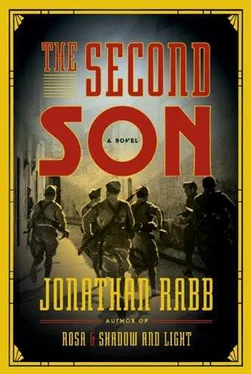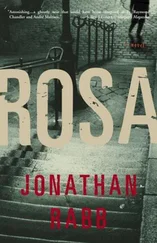Jonathan Rabb - The Second Son
Здесь есть возможность читать онлайн «Jonathan Rabb - The Second Son» весь текст электронной книги совершенно бесплатно (целиком полную версию без сокращений). В некоторых случаях можно слушать аудио, скачать через торрент в формате fb2 и присутствует краткое содержание. Жанр: Политический детектив, на английском языке. Описание произведения, (предисловие) а так же отзывы посетителей доступны на портале библиотеки ЛибКат.
- Название:The Second Son
- Автор:
- Жанр:
- Год:неизвестен
- ISBN:нет данных
- Рейтинг книги:4 / 5. Голосов: 1
-
Избранное:Добавить в избранное
- Отзывы:
-
Ваша оценка:
- 80
- 1
- 2
- 3
- 4
- 5
The Second Son: краткое содержание, описание и аннотация
Предлагаем к чтению аннотацию, описание, краткое содержание или предисловие (зависит от того, что написал сам автор книги «The Second Son»). Если вы не нашли необходимую информацию о книге — напишите в комментариях, мы постараемся отыскать её.
The Second Son — читать онлайн бесплатно полную книгу (весь текст) целиком
Ниже представлен текст книги, разбитый по страницам. Система сохранения места последней прочитанной страницы, позволяет с удобством читать онлайн бесплатно книгу «The Second Son», без необходимости каждый раз заново искать на чём Вы остановились. Поставьте закладку, и сможете в любой момент перейти на страницу, на которой закончили чтение.
Интервал:
Закладка:
Radek smiled. “Isn’t there a little pride somewhere in there, Nikolai? Something for the German greater good?”
“Tremendous amounts,” said Hoffner. “How much?”
Radek’s smile grew as he bobbed his head from side to side, calculating. “A hundred thousand seats in the stadium … Maifeld-that’s over twenty-eight acres of open ground-the practice facilities … Maybe”-he shot a glance at Franz-“what do you say, Franz? Twelve, fifteen million?”
“Twenty-seven,” Franz said blandly, as he continued to stare out.
“Twenty-seven million?” Radek’s disbelief was matched only by his cynicism. “Really? That much? Just imagine getting a cut of that.”
“Yah,” said Hoffner. “Just imagine.”
“They want to throw away the city’s money on this, Nikolai, I’m happy to help them.” Hoffner tossed his cigarette out and Radek said, “So you didn’t think of pulling out the old saber? Helping the great German cause?”
The thought of dragging his ancient legs onto the strip forced a dismissive snort from Hoffner. “I think Fraulein Mayer rounds out the token half-Jews on the team, don’t you?”
It had been in all the papers, the girl’s “special dispensation” from the Reich’s Committee. Mayer, a former world champion now living in America-and a Jew only in name-had been made an “honorary Aryan.” It seemed demeaning, no matter which way one leaned.
“She’s not doing them any favors,” said Radek.
“Who,” said Hoffner, “the Jews or the Reich? My guess, she wins something, she’ll have to give it back anyway.”
The Reichssportfeld sits on over three hundred acres of Grunewald forest in the far west section of town. From central Berlin, it is a relatively easy trip past the Tiergarten if one makes sure not to take the truck roads out to the Halske or Siemens factory sites-unless, of course, one is desperate for a rotary engine or any number of other electrical engineering devices. If one keeps to the low roads, the first behemoth to appear on the horizon is the stadium itself. It looms at the end of the wide Olympischer Platz, stone and granite leading all the way up to the double columns of the Marathoner Gate, with the five rings pitched in between. Though ostensibly the brainchild of the March brothers-Werner and Walther-the entire complex has the feel of an Albert Speer design, the thick limestone and wide columns telltale of the Reich’s architectural wunderkind. There was a rumor that the Fuhrer, on hearing of Werner’s plans to create a modern wonder-steel, glass, and cement-said he would rather cancel the games than have them take place in “a big glass shitbox.” But that was only rumor.
Next are the Maifeld parade grounds-vast, wide, green, resplendent-surrounded by nineteen meters of elevated ground, two meters higher than the stadium itself. Originally slated to hold over 500,000 people, it manages only half that (much, again, to the Fuhrer’s dismay), but there is the hope that, with the new health incentives-and the aim at a “fitter, sleeker, trimmer” German-the grounds might actually squeeze in close to 300,000 in the not-too-distant future.
And finally there are all those squares-August Bier Platz and Kornerplatz and Hueppeplatz (absolutely vital to name one of them after the German Football League’s first president)-but the real gem is the Langemarck-Halle. It is a series of cavernous rooms built to commemorate the gallant singing student soldiers ( “Deutschland, Deutschland uber alles” ) who gave their lives in the early days of the war, charging in full chorus against the hordes of ravaging Belgians, who were bent on destroying the mythic German spirit. That the battle took place at Bixchote (so much harder to spell, and not really all that German-sounding) never deterred the planners from immortalizing both the place and the moment of the century’s first spilling of Aryan warrior blood. The caverns sit under the Maifeld grandstands and directly below the bell tower. Someone had suggested early on that they call it the Fuhrer Tower, but Hitler himself had vetoed that. Why overstate things?
The place was oddly quiet as the car pulled up. Hoffner noticed the requisite guards and policemen roaming about. There might have been more security elsewhere, but no one would have been stupid enough to stop Radek’s Daimler. These were his grounds; even the SS knew to leave him alone.
The car stopped and the four men stepped out onto Olympischer Platz. Somewhere off in the distance a crackling light from a welder’s torch cast shadows against a far column. Hoffner wondered if perhaps Werner March himself might be somewhere about, chiseling out the last bits and pieces. March had promised a dedication ceremony for early May. Instead, he had quietly announced the stadium’s completion about two weeks ago: AND NOT A MOMENT TOO SOON, the BZ headline had read. The editors had hoped to run a cartoon of March holding up the back of the stadium on his shoulder, a wide smile on his sweating face, but they had received a note from the Reich’s Propaganda Office advising them that such a display-“humorous as it was”-might be seen as beneath the paper’s dignity. How anything might be seen as beneath the BZ ’s dignity remained open for debate.
Radek stepped around to the back of the car, pulled open the boot, and removed a bag. “The boys are going to stay here,” he said, refastening the latch, then bobbing his head toward the gate. “How’d you like to see the stadium, Nikolai?”
They walked in silence along the lamplit arcade: the place seemed to demand that kind of reverence. Flags from the competing countries hung limply from their poles. Searchlights shone high onto the stadium’s facade, arching up and over and misting into the gray of the sky.
Hoffner stared up as they passed under the gate. A few stars had managed to break through the cloud cover, but for the most part it was just swirls of black hovering above the iron rings.
Two or three guards strolled along the plaza beyond; all were careful not to notice Radek and his companion.
Hoffner said, “Do you smell that?”
“What?”
“Bad beer and piss.”
“I do,” said Radek.
“And that’s not a problem?”
“Not much they can do about it when the wind shifts.”
Hoffner was surprised at the ease of the answer. “So this happens all the time?”
“Three times a day.”
Hoffner was waiting for an answer.
“Strength Through Joy Village,” Radek finally said. “The thing’s about half a kilometer from here. It’s even got its own train station.”
“You’re joking.”
“Would I joke about that?”
They made their way between the central columns and into the stadium’s main entryway. Their footfalls began to echo.
Radek said, “It comes equipped with Strength Through Joy Beer Halls, Strength Through Joy Children’s Tents, Strength Through Joy Crappers. There might even be some Strength Through Joy Tits thrown in, but I think those girls are reserved for the pure Aryan clientele. That’s something you don’t get on the cruises.”
The Strength Through Joy recreation camps and holiday cruises had been set up by the Reich as a thank-you to the working class of Germany. The simple folk were, after all, the very spirit of the Reich. And such spirit-pungent as it was-deserved a little knockwurst and dancing on the cheap.
“Your boots are good?” said Radek. “It’s going to be wet.”
They mounted a stairway, arrived on the second level, and then moved down a short tunnel. Somewhere toward the middle of the tunnel, the stadium grounds began to come into view.
If Hoffner had hoped to find something clever or demeaning to say, he couldn’t. The place was overwrought, militaristic to a fault, self-consciously classical, larger than any other space he had ever seen, and breathtaking.
Читать дальшеИнтервал:
Закладка:
Похожие книги на «The Second Son»
Представляем Вашему вниманию похожие книги на «The Second Son» списком для выбора. Мы отобрали схожую по названию и смыслу литературу в надежде предоставить читателям больше вариантов отыскать новые, интересные, ещё непрочитанные произведения.
Обсуждение, отзывы о книге «The Second Son» и просто собственные мнения читателей. Оставьте ваши комментарии, напишите, что Вы думаете о произведении, его смысле или главных героях. Укажите что конкретно понравилось, а что нет, и почему Вы так считаете.












